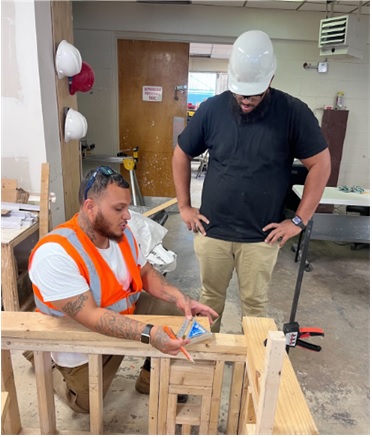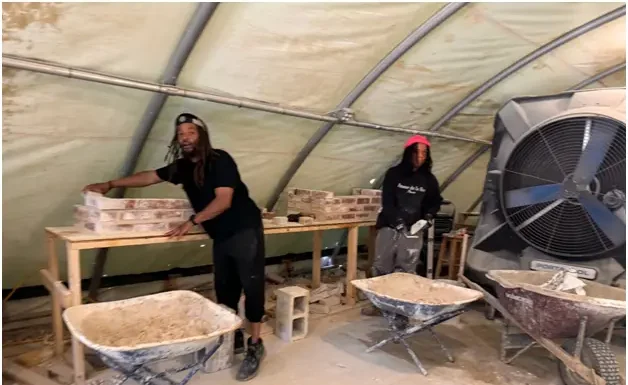If you live in Pennsylvania and are exploring masonry training in Philadelphia, you are already in one of the nation’s strongest construction hubs. In fact, the construction industry is expanding, making use of the economic transitions, technological advancements, and the transforming market needs. According to the Bureau of Labor Statistics, the number of jobs in construction is expected to increase by 4% between 2022 and 2032. Furthermore, this means around 160,000 new jobs are added each year.
Additionally, this expansion implies that young professionals must choose wisely about which skilled trade delivers the most durable future. Among the most preferred options today are framing and masonry technician training in Philadelphia. Similarly, framing technicians today are in high demand too. This makes their comparison invaluable for students looking forward to making a career in skilled trades.
Put your mind to choosing masonry training in Philadelphia or its framing technician training. This is because the decision will have a significant impact on your career stability, job security, earning potential, and overall future growth.

To begin with, masonry technicians work with concrete and bricks to create strong and long–lasting buildings. Furthermore, their expertise and skills from training ensure that homes, residential buildings, schools, and even commercial buildings last for more than a decade.
Moreover, the U.S. market for construction and masonry is today worth more than $30 billion annually. Therefore, highlighting the sector’s strength.
In contrast, framing techs work on skeletal structures. Framing technicians build the frame of buildings using wood or metal. Additionally, they establish the basic foundation for building walls, roofs, floors, and terraces, or everything.
Overall, the employment outlook for both of these skilled trades is strong. Masonry jobs will remain stable. This is due to the increasing demand for sustainable construction materials.
On the other hand, the framing industry expects a cyclical demand coming from the real estate markets.
|
|
|
|
|
|
In conclusion, data and statistics show that masons experience a greater demand than framing technicians. This is because fluctuating housing cycles barely affect the brick and block structures.
| Aspect | Masonry Technician | Framing Technician |
| Training Options | PTTI’s Masonry Program with masonry classes and masonry courses | Short vocational programs or apprenticeships |
| Key Skills Learned | Mortar mixing, block cutting, bricklaying, blueprint reading, construction training, and safety protocols | Measurements, saw operation, and material handling |
| Duration | 6–12 months (quick and structured) | 1–3 years (apprenticeship-based) |
| Specialization | Can expand into a concrete technician course in Spring Garden | Limited specialized training |
| Employment Advantage | 30% higher employability with certifications | Dependent on apprenticeship opportunities |
One of the biggest reasons masonry is considered more future-secured is the sustainability factor.
For example, materials like concrete and brick are highly resistant to fire.

Proper trade education from a reputable, certified trade school elevates career earnings. For instance, students after completing masonry courses in Philadelphia find beginner job roles faster.
Similarly, graduates from a concrete technician course in Spring Garden can easily earn 15% more than their peers without any formal trades training.
According to the National Center for Construction Education and Research, skilled masons with certifications can earn up to $70,000 annually. Comparatively, framers rarely cross the $60,000 mark without supervisory roles.
In general, the masonry route is more straightforward. This is due to the structured learning options available. Many institutions provide masonry classes, construction training classes, and also advanced masonry courses that build employable skills quickly.
Comparatively, framing programs rely mainly on apprenticeships, which can last much longer.
Masonry technicians work for building government schools, buildings, industrial and commercial plants, and even major residential projects.
On the other hand, farming techs are involved mainly in housing. By contrast, masons serve multiple industries, offering stronger job security.
Furthermore, construction training program certifications also improve long-term employability.
| Factors To Consider | Masonry Technician | Framing Technician |
| Average Salary | $48,000 annually (can exceed $70,000 with certifications) | $47,500 annually (rarely exceeds $60,000) |
| Industry Demand | Consistent demand in residential, commercial, and government projects | Tied heavily to housing market cycles |
| Training Duration | 6–12 months via masonry courses or masonry classes | Mostly apprenticeships; may take 1–3 years |
| Sustainability Value | High – brick, stone, and concrete are durable and eco-friendly | Moderate – dependent on wood and metal supply |
| Future Security | Strong – resistant to automation and benefits from climate-resilient construction | Weaker – modular housing reduces framing demand |
| Career Versatility | Broader – also includes pathways like the concrete technician course in Spring Garden | Narrower – primarily residential framing |
| Technology Adaptability | High–masons adapt easily to 3D printing and green construction | Lower – pre-fabrication reduces manual framing roles |
Check out our masonry training and framing programs to get deeper insights into the trades and their training.
Both masonry and framing skilled trades offer viable career opportunities in the construction industry.
Whether it is framing technician training or masonry training in Philadelphia, the choice is yours to make. Choose what aligns with your interests best, and never look back.
Read more :